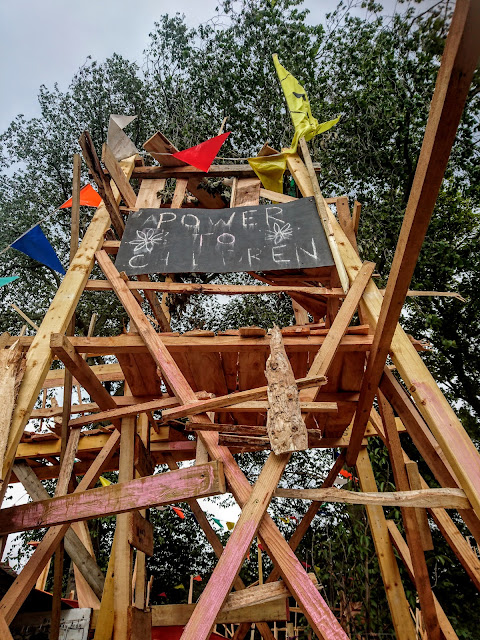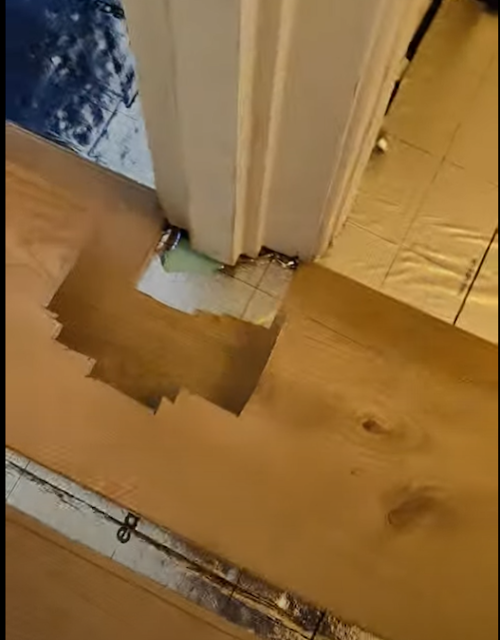This video was taken, for reference, while installing laminate flooring in April 2022. Trying to fit a plank around a door jamb was a bugger. We cut out paper plans and replicated them on planks at least three times. To connect a piece to its neighbour it must be positioned on its long edge, at an angle, but between the door jamb and the neighbouring plank there wasn't space. We had to slide it in instead. All these stages were parts in a slow process of trial, error and slow realisation.
R explained a better system but I hadn't seen it so didn't know what he meant. Later, after we had already bought the product we installed we discovered the other in a shop. The planks click properly into their neighbours. They don't rely on a fragile sliver of cardboard pulp which degrades if you don't get it right quickly. This is why I thought he wanted to remove it. Was it mordido?
I had been making an effort with Spanish since the previous September. Communication in Buenos Aires (2016) was difficult, despite halting conversations with taxi drivers. I rarely took the bus, terrified of ending up mapless and language-less in some unpredictable suburb.
Between 2017 and 2020, I find I made nine trips to Spain. Going to Argentina in 2016 was the catalyst. Some were just an extended weekend. Four of the longer trips were with the boys. It came to a surprising and substantial 60 days in all. I didn't usually stay integrated with families being either alone or speaking English with the boys. Somehow navigating cities, casual chat and arranging Airbnb practicalities was easy. Beung able to get by in Spanish just happened. I could not tell you how.
Friends I met at the start of 2019 noticed a big difference when we met again at the end of 2022.
Undoubtedly, more practice helped but if one feels safer and therefore more relaxed in an environment, it affects everything. While porteños were warm and helpful the city was not particularly safe. Europe, home, was very distant. There were echoes of parts of our continent in the beautiful, crumbling architecture. The lilting porteño speech sounded Italian. Still, everything was unfamiliar. After a few days of jetlag, milonga fear and being warned by Janis about everything from traffic to thieves, I was as jumpy as a cat in a bag of snakes. Speaking Spanish would have helped but my priorities just then were staying alive, not being robbed, finding milongas, avoiding getting too lost and experiencing Argentinian milonga culture, in about that order.
I started my current Duolingo streak on 1 May 2019. One doesn't learn much but it's a useful prompt to keep doing something with the language.
Apart from that, I had translated some tangos. I watched the odd film in Spanish, poniendo atención, but hadn't "studied" the language in the conventional sense.
Doing DIY in Scotland is how I learnt most of my Spanish, certainly all the useful stuff that's not about tango angustia y pena'
Some kind of working holiday or séjour in the target language is how many people pick up another language. I was lucky to be able to do so at home. You pick it up because you are focused on something else - the work, the getting around, the communicating with your host family. You don't pick up a language in a classroom with books. You sweat at it.
A lot of people's trips abroad, mine too, are to do with looking or tasting. Compare how many photos you have of trips abroad compared to how many videos or recordings where you are trying to understand or learn something. That is why I learned more Spanish here at home than I did abroad. I was using the language to do something. Specifically, I learned the language by also learning to do something else. There is very likely a clue in that.
I have used books, or looked things up to learn languages and I know some good linguists who do too. But exercise books and, grammars are minor props, small paths, diversions. They are not the broad way ahead for effective language learning. Everyone is different, learns differently and has different preferences, but there is a lot of fear in learning languages. My intuition is that people often hang on to these props and structures from that fear. We don't ever ask ourselves these questions, as language learning infants and children. It isn't a natural way to learn.
Many do want to understand, how another language is working, structurally. In some cases this is almost an excuse, a procrastination for getting on with speaking and understanding. If you want to use a book in language learning, pick up a novel, a puzzle book, a manual, a magazine, a recipe book, something that will engross you.
Some people are not procrastinating the language; they do learn it, but more slowly. I think some get waylaid by the interest of the structure of the language; the differences are fascinating to them. They are like the tourist or the student, agog with architectural wonder inside a cathedral instead of getting on with the business of practical worship (or spiritual experience).
A great limitation of our culture is that rather than asking good learners how they learn, we assume they have a natural talent or a great teacher. We are uncurious about their methods.
People can get hung up on the how and the why of learning something rather than the it just is or the just do it. They are all But, but, but... I remember being in turn frustrated and in awe of the differences there are in French compared to English. Ultimately, if you want to speak a good French you will have to accept them. You come to delight in them, then they become second nature.
Life is much easier when you stop fighting. Dad said this, for years. When I stopped fighting weirdness in other languages my linguistic life became much easier. You see this in British teenagers all the time. They are baffled by the sheer oddity of constructions in other languages. It isn't weird, anyway, it's just different. You accept the difference. I decided early on in Spanish to acknowledge the differences, accept them, imitate them. Just copy the common templates - of phrase, of idiom, of exclamation - that native speakers use all the time. They are in songs too. Songs help you learn so called "advanced" grammatical tenses easily. And don't copy too consciously, do it as part of doing something else and self-consciousness drops away. If you pay attention to language, to what people are saying, you don't have to consciously file phrases away with a note to self. Your brain will offer up the right phrase at the right time, eventually. Trust in the process, give it time and don't be too demanding.
Language is a wonder, but it is fundamentally a tool for something else.
Sliding in the plank meant removing the cardboardy stuff that was supposed to make it slot in to its neighbour. This is what R was trying to explain and this is probably the day I learnt that it's not mordado, but mordido, which means something like chewed/gnawed / bitten. I say "something like" because nowadays I only look up words if I can't guess the likely or approximate meaning. I might have stupid for a second, more so looking back but there is no need. This is how we learn. It's normal and it's fine.
There might be another word for gnawed, specifically; in fact I think it starts with 'r', but until I need to use it or understand it I will let it lie.














